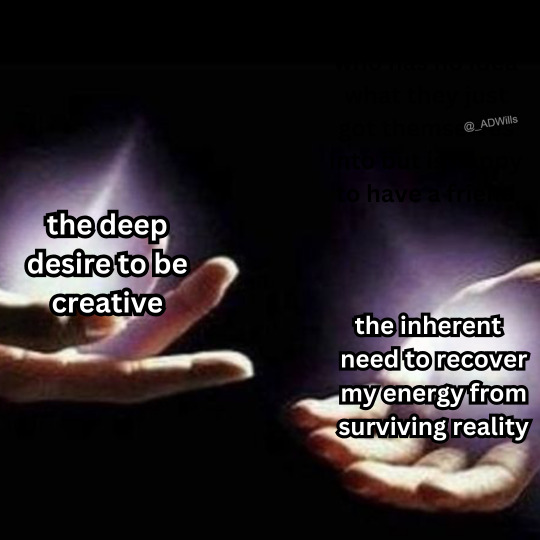Text
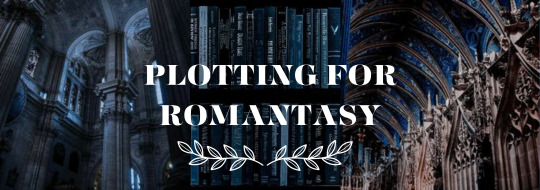
Plotting Tips for Romantasy 𓆩🖤𓆪
Check out my masterpost for more tips :)
Okay, What IS romantasy?
Generally speaking, romantasy is a commercial subgenere that provides equal weightage to romance and fantasy.
If you can remove one side of the plot and still have a complete story, you may not be fulfilling genre expectations.
To summerize:
Romantic Fantasy = Fantasy + Romantic subplot
Fantasy ROmance = Romance + Fantasy subplot
Romantasy = Romance + Fantasy
Balancing Romance and Fantasy Elements
Combine two or more tropes from each genre.
Romantasy is all about an interesting mix-and-match. Think of your favorite romance/fantasy tropes, then marry them:
Enemies to Lovers discover a Portal to Faerieland in their Contemporary Office setting.
Grumpy and Sunshine accidentally anger a Troupe of vengeful witches while on a Road Trip
a Second Chance Couple is thrown into a Forced Proximity in order to plant hunt, and she must keep her Botanical Magical Powers a super-secret from him.
Keep reading
327 notes
·
View notes
Text
“If she starts cleaning up imaginary lint from the sofa, one sort of person is suggested. If she spills her scotch and lets it sink into her skirt without seeming to care, that suggests another. Something prosaic like sitting down and reading the newspaper does not tell the readers much. But if she turns at once to the medical column, that might tell us something. The actions you give your characters should be densely informative.”
— Jerome Stern, Making Shapely Fiction (via the-right-writing)
13K notes
·
View notes
Text
“how did you get into writing” girl nobody gets into writing. writing shows up one day at your door and gets into you
136K notes
·
View notes
Text
my writing fundamentally changed forever ten years ago when i realized you could use sentence structure to control people’s heart rates. is this still forbidden knowledge or does everyone know it now
51K notes
·
View notes
Photo
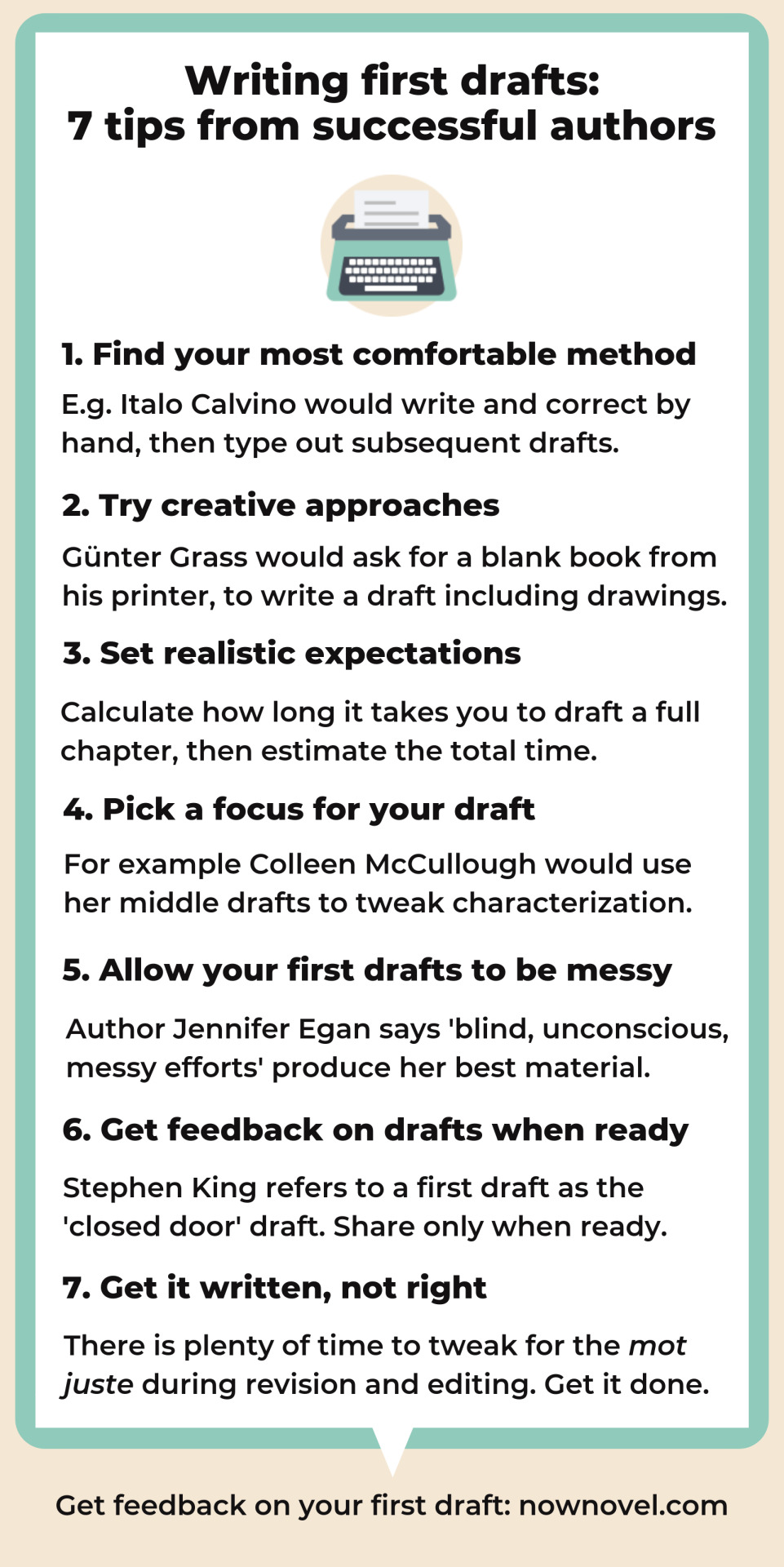
(via Writing first drafts: 10 ideas to reach final drafts)
179 notes
·
View notes
Text
When you are writing someone In Character, it means you are writing them consistent to their own personality and experiences. And honestly, sometimes character are just plain ridiculous. Because People are just plain ridiculous, and your characters are supposed to be people. As opposed to flat cardboard cut outs with nothing more than a face and name. Or you know, a sexy face meant to be kissed and then killed.
when fanfic authors say that they don’t decide what happens in the story that the characters make the decisions i imagine it like this:
writer: *sitting down* type type type type *squinting at the screen* type type type
writer: *gasp* WHY WOULD YOU DO THAT…… type type type
32K notes
·
View notes
Text
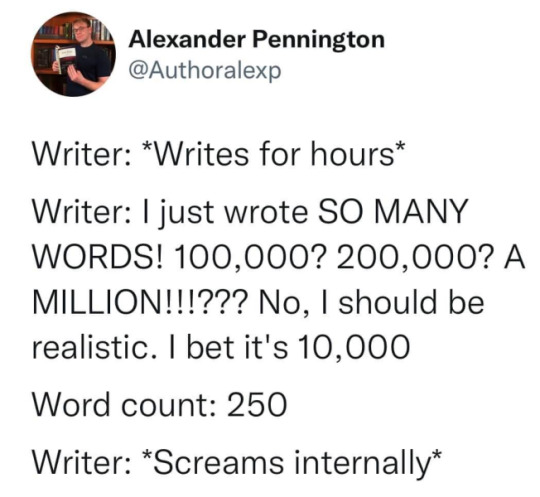
My brother who I live with. Just sent me this. I opened the door, screamed RUDE! And promptly shut it again as he laughed.
649 notes
·
View notes
Note
any tips on how to create the feeling of dread?
1 - Build a foundation ahead of time so the reader knows why the character should be feeling dread in that moment.
2 - Use sensory details to immerse the reader in the moment... what can the character see/hear/smell/taste/touch?
3 - Use vivid description, metaphor, simile to create an ambiance of dread.
•••••••••••••••••••••••••••••••••
I’ve been writing seriously for over 30 years and love to share what I’ve learned. Have a writing question? My inbox is always open!
LEARN MORE about WQA
SEE MY ask policies
VISIT MY Master List of Top Posts
COFFEE & FEEDBACK COMMISSIONS ko-fi.com/wqa
51 notes
·
View notes
Text
Meaning of LGBTQ+ labels in an extremely accepting world with magical transition
Question
Hey, I’m currently working in a fantasy world where that is accepting, and I’m thinking that even if transitioning via magic is widely available, would some trans people still not want to - I’m not sure how to put this sorry if it comes out wrong - transition to exactly what their body would be had they been cis? And what might be some of their reasoning for this? I looked through your magical transition tag and the biggest problem seemed to be that transitioning via magic leaves out a pretty big chunk of experiences that would be valuable to trans readers today, and yeah, I’m not sure how to avoid that, considering in this world 1) wouldn’t be prejudiced - so I can’t do what, for example, Dreadnought by April Daniels does showing the parts of being trans outside of transitions (nor do I think I should, really, since I’m cis and it’s not up to me) and 2) the magic system I’ve made would definitely be able to help trans people transition so I’m not quite sure what to do with that.
Currently, I’m thinking that, since bodies wouldn’t really be gendered, most would alter(would that be a good word? It’s the best I currently thought of but it doesn’t sound right?) parts of their body that causes them dysphoria but otherwise just live their lives. There’s also this bit about me being unsure as to how to define ‘gay’ if nonbinary people are normalised but and also if people stopped defining gender by genitals, what childhood would look like in that world but. I do wonder if I’ve cast the concept a bit too far and if I should just rein it in a bit and have it maybe a bit less, for lack of a better word, ‘like that’? I guess my biggest question is how a world like that would look like and function, and since I’m cis I thought it’d be better if I asked some trans people their thoughts?
Also there’s two parts that didn’t quite fit about first same sex political marriages and a bit about how trans people tend to be better at medical magic, since something that makes practitioners of medical magic more effective is being able to mentally separate the concept of the body from the concept of the person and I wonder your thoughts on it.
Sorry that this turned out really rambly or sounds kind of half baked lol. I started this out just wanting to ask about magical transitions but then the fact that I’m sending an ask made my socially anxious self question parts of my logic, haha. So uh- yeah-
Answer
So, I’m going to try and segment this one out, in order of what’s easiest for me to answer. I realize you’ve looked through our blog a bit, so I apologize for the things I inevitably repeat, but I do feel they are important to address.
How to define gay with trans people (esp nonbinary people) normalized
Being gay is not currently defined by genitalia, contrary to what T*RFs seem to believe. To get to what it actually is, I’ll explain how orientation labels tend to be used in the trans community. To me, being gay means that I am interested in people who identify similarly to me in some way in terms of queerness. For some people, it’s trans lesbians who date women regardless of them being cis or trans. Whether nonbinary people are automatically part of that depends on the individuals. I’ve dated lesbians before (who were trans - I would not feel comf dating a cis lesbian) who used the older definition of it that means what we use the word “sapphic” to mean today. I also know people who use the term gay as shorthand for “I’m a man who is generally attracted to people in the vicinity of manhood” or even masculinity (even though masculinity and manhood are different - it’s complicated, people are complicated).
The point of labels is that they are a shorthand to communicate complex topics. They aren’t meant to replace those longer explanations, they are only to make communication referring to those complex identities easier. Labels are descriptive and not prescriptive, and every gay person has slightly different feelings.
I’m not going to tap into this too much because it only gets more complicated, but there’s also people who may feel differently about their orientation based on if they are attracted to androgynous people who may identify as the same gender to them, vs agender people who may not. I have to be honest that I haven’t actually heard anyone take this all too seriously or account that into the labels they ultimately choose to give, but it’s something sometimes that people talk about. I don’t think you need to go into it in your story, or even that you should per se, I just would feel remiss to not mention it as a thing people think about. I would generally say this is more of the binary variant folks who tend to wonder about it though, I don’t think cis people who date us worry about it. It’s not something that has a conclusion or universal answer. It’s just something people question the technicalities of sometimes in extended conversations.
My assumption for the future is that people will probably be taking to account community culture and history when using labels. This is already kind of a thing and it’s why a lot more people tend to identify with bi than pan, in part. There are a lot of people who identify as transsexual these days also because of the specific history of the community and what that means in relation to how they see themselves. This isn’t a flawless thing and there’s always a lot of intra-community discourse about the validity of weighing this vs your actual felt experience, and whether there is a prescription experience for every label that people using it should meet. (Again, this is So Dicey, I am not doing justice to the immensity of how much has been said about it. But it’s a thing people talk about in-community sometimes.)
Would trans people all want to look cis if they could? Why/why not?
I absolutely do not want to look cis. Being trans is an integral part of who I am, and people cannot know who I am without knowing that I am trans. I’d say that the majority of trans people who stay community-involved/connected to other trans people skew towards preferring to be visibly trans in some way. At least in a way that other trans people recognize us. But I also know a lot of trans people who love their bodies and don’t want to change anything. And no one does need to change anything to be a different gender than they were assigned. That’s all being trans means. (Add nuance for cultures outside of the colonial one I’m speaking from, who may have different ways of doing gender stuff.)
I think a lot of people with marginalized bodies, regardless of transness, can probably relate to being more concerned with how other people view our bodies than how we do. I’m perfectly content to let myself be fat and cozy and stim in the comfort of my own home, but I do feel like I have to put my guard up in public to get respect. I’m put in a position where I basically have to assume people expect me to apologize for my body. (Especially as a person who uses a rollator, and constantly needs accommodations from the public to open doors, move aside, etc.)
That isn’t to say that none of us would want to change a thing if we all had the equal chance and freedom to do so. But it wouldn’t be as big of a deal, and we would have more freedom to pick and choose the stuff we want. It is not that I want to be any particular gender, it is that I want to be myself, I want to make my body something I’m comfortable with. There’s some explaination of what dysphoria is here which might help parse out the particulars. (For the love of all that is good: please do not use the DSM to tell you what gender dysphoria is. That’s not what it is to the community, and the DSM should not have transness in it to begin with.)
But in an ideal world I would also have a lot of retractable body parts. And to be frank, I think there are cis people who would also probably find utility in such a thing. I’m going out on a limb here but I bet there are cis perisex women who would probably like to be able to retract their breasts while running down the stairs. And there are probably cis perisex men who would want to turn off boners at will too. There already are cis people who take HRT for a variety of reasons and who get surgeries of all kind. Trans people are not all that unique in any way besides our oppression in this particular regard.
The main thing that defines us is that we identify outside how we were assigned, gender-wise.
Ethics of magical transition in your specific world
I want you to investigate your purpose for your story. Do you want representation or do you just want to write a whimsical story?
I generally give advice on writing good representation, including in a fantasy context. I feel that it nullifies representation when the audience of that demographic is… well… not represented.
Transitioning via magic would not just leave out “a chunk” of trans experiences today - they would literally leave all of us out. We don’t have magic to transition.
There are aspects of the way transition can be written in a magical context to replicate real-world hormones and procedures, and that’s generally what I recommend to people. You can even enhance it and make it so that you can customize the formula for what you want.
Trans people being better at medical magic because of better ability to separate concept of body + person
I don’t personally like this because the idea of us not being our body is a narrative used to take away our bodily autonomy. Here’s an article I wrote about it in 2018 and here’s some stuff we’ve written before going into the issues with the “born in the wrong body” narrative. It isn’t our body as the fundamental difference here. My body is mine, tits or not. There are definitely trans people who resonate with this, but it’s more complicated.
You could also probably talk about this lens when it comes to disabled people. As a disabled person, my worth is often seen as what kind of labour I can put forth in order to give somebody else a profit. My worth is seen as limited, because my body is limited. That’s ridiculous.
But I think it’s reasonable that a person who is disabled would be better at medical magic because we’re more likely to know how different parts of the body work in order to problem-solve when possible. I’ve learned WAY more about how pain is experienced, what different bones, joints are, how collagen and cartilage works, different tests to figure out where an endocrine tumour is and what the risks associated are, etc etc from disabled people, than I have ever learned from a doctor or even a first aid course. I’ve also learned a lot about how to adjust and make accommodations for specific contexts and ways my body doesn’t work, and what kinds of help I need for that. That might be something to work with instead of trans people specifically.
I would honestly just try and frame it away from the person vs body thing. I think you could definitely write it in a way that works, but I think there’s a lot of work that would be needed to do it properly. You would need to understand the level of subhumanization implied when it comes to separating people from their bodies. You need to be able to acknowledge that even if we may be separate from our bodies in some regard, like if we have souls or whatever, we still have ownership of our bodies, some kind of tethered bond, at least as long as we are alive.
What this world would look like, if written well
I hope I’ve gotten to most of what you were wondering about, feel free to send a message when we can open the ask box again if there’s something I’ve left out. (Or reply, etc.)
I’d say that ultimately it’s okay if your story is not wholly utopian, and I think even if you go for that (at least in terms of Acceptance), it probably isn’t a good idea to label it that way because there might be more to the situation.
There are also ways to acknowledge trans experience in a world where questioning is totally normal. I mean, we already question who we are in so many other regards as people when we grow up. And for the rest of our lives even. Existing in a living body is an act of constant creation and regeneration until we die, and even then, we decay into an earth which grows things.
Have characters who are still figuring it our or who aren’t sure. Or who are, and change their presentation or transition-related stuff more often than those who aren’t, because fluidity is part of their nature. (I go on and off testosterone all the time! That’s totally fine and normal and doesn’t mean I am insecure about what I want at any given time.) (I don’t even identify as genderfluid, sometimes I like estrogen more than testosterone and vice versa. Though my gender has evolved a bit over time.)
I think there’s a lot of different and cool possibilities for what the future may hold and what fantasy can hold when it comes to trans people. I would also say that you don’t need to go in depth with this stuff, it’s just extremely helpful to know as much as you can. It makes it easier to write and to know where to step for representation that truly makes us feel seen, or like kin to a character.
It’s important to keep in mind that even if your story is super accepting, your audience is still living in a world that isn’t exactly that.
How a character in a very accepting world may feel about magical transition, is obviously going to be different than how it lands with your audience. The trick to good representation is writing a world that reaches enough out to us to pull us in, and makes us want to keep reading. Seeing fully 3 dimensional trans characters is part of that. Even if we can’t see ourselves as a 1:1 parallel, it is nice to see data points that we might relate to our see our community members in.
This may not be for your story, but I also want to put it out there that it’s okay to have minor characters having their own problems and conflicts and not addressing that onscreen. A lot of cis people are understandably steering away from making huge complicated coming-out-went-awry (as the main focus) stories about trans people. But that doesn’t mean you should only ever represent trans people who were always completely accepted. Tbh, even trans people who are now accepted may have had roadbumps in that or lost a friend or several. It’s not always 100% good or 100% bad. And you absolutely Do Not need to make that part of the plot in order to write trans people who have been through that kind of thing. It can be in the past or offscreen, it can be just something that shows in your trans character’s decisions about who to trust or whatever. Not every obstacle we’ve been through is death, and not every acceptance we’ve had was easy or unfought for. Our lives are complicated and nuanced and there is room along the gradients. Develop your characters’ internal and external lives far beyond what goes on in the scenes you write, and your audience will recognize the difference.
- mod nat
101 notes
·
View notes
Text
I am once again reading something set in a city that I have lived in written by someone who clearly has not done much/any research about that city.
I recommend doing the bare minimum of going on Google Maps and seeing if places are within easy walking distance of each other before you have people walking from one place to another.
Other things you might want to research are:
How do people generally travel?
What types of public transportation exist/what are they referred to as (e.g., subway vs metro)?
How can someone literally get from Point A to Point B?
If you're writing about a metropolitan area, who lives in the city versus the suburbs/exurbs?
Who lives in what parts of the city/town/area?
Is your character likely to rent versus own?
Are they likely to be able to afford to live alone?
What attractions are tourist attractions versus places where locals go?
What third places might exist?
1K notes
·
View notes
Text
I have … a tip.
If you’re writing something that involves an aspect of life that you have not experienced, you obviously have to do research on it. You have to find other examples of it in order to accurately incorporate it into your story realistically.
But don’t just look at professional write ups. Don’t stop at wikepedia or webMD. Look up first person accounts.
I wrote a fic once where a character has frequent seizures. Naturally, I was all over the wikipedia page for seizures, the related pages, other medical websites, etc.
But I also looked at Yahoo asks where people where asking more obscure questions, sometimes asked by people who were experiencing seizures, sometimes answered by people who have had seizures.
I looked to YouTube. Found a few individual videos of people detailing how their seizures usually played out. So found a few channels that were mostly dedicated to displaying the daily habits of someone who was epileptic.
I looked at blogs and articles written by people who have had seizures regularly for as long as they can remember. But I also read the frantic posts from people who were newly diagnosed or had only had one and were worried about another.
When I wrote that fic, I got a comment from someone saying that I had touched upon aspects of movement disorders that they had never seen portrayed in media and that they had found representation in my art that they just never had before. And I think it’s because of the details. The little things.
The wiki page for seizures tells you the technicalities of it all, the terminology. It tells you what can cause them and what the symptoms are. It tells you how to deal with them, how to prevent them.
But it doesn’t tell you how some people with seizures are wary of holding sharp objects or hot liquids. It doesn’t tell you how epileptics feel when they’ve just found out that they’re prone to fits. It doesn’t tell you how their friends and family react to the news.
This applies to any and all writing. And any and all subjects. Disabilities. Sexualities. Ethnicities. Cultures. Professions. Hobbies. Traumas. If you haven’t experienced something first hand, talk to people that have. Listen to people that have. Don’t stop at the scholarly sources. They don’t always have all that you need.
103K notes
·
View notes
Text


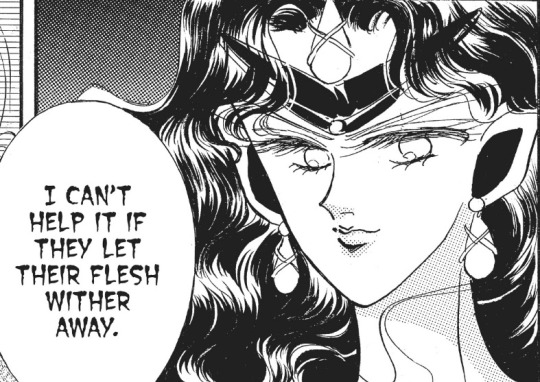

🥶
28 notes
·
View notes
Note
I'm having trouble writing action scenes that feel fast paced and dangerous, any advice?
Fast-Paced/Dangerous Action Scenes
Creating a sense of danger in your action scene is all about what you've laid out in advance. If you want the scene to feel dangerous, the reader needs to understand the danger going in. What is the situation that led to this dangerous action sequence? Who is involved and why are they in danger/dangerous? What's at stake for everyone involved? Without that built-in sense of danger, it's hard to make something feel dangerous in the moment.
Creating a fast-paced action scene can be accomplished by leaning more on action and dialogue and less on exposition (do more "showing" than "telling), using shorter sentences and paragraphs, using strong but succinct description, limiting unnecessary words and filter words, keeping the audience close to the immediate action, and making good use of sensory description to pull the reader into the moment.
Happy writing!
•••••••••••••••••••••••••••••••••
I’ve been writing seriously for over 30 years and love to share what I’ve learned. Have a writing question? My inbox is always open!
LEARN MORE about WQA
SEE MY ask policies
VISIT MY Master List of Top Posts
COFFEE & FEEDBACK COMMISSIONS ko-fi.com/wqa
227 notes
·
View notes
Text
7 Tips To Winning A Poetry Chapbook Contest
6 notes
·
View notes
Note
Sometimes a lot of people kinda forget that Gojo's been practically raised in isolation. His birth literally shifted the balance of the world. He's the closest things to a god born unto the world. And that means he's known nothing other than the pedestal he's been put on since birth as the closest thing to him. That's why Geto and Shoko meant a lot to him. That's why Geto was the one he opened his heart to. Geto clawed his way up and climbed up to him. Gojo Satoru could see someone at his level for once in his life.
That's why he loved Suguru. Still loves him. Could probably never love as much he loves Geto Suguru.
And then shit hit the fan and Gojo's rosy springtime of youth was violently taken from him. (If Geto had said on that day to kill everyone, the Jujutsu world would've been a totally different world.)
That's why Kenjaku was able to do what he did. Love makes even the divine fall after all.
Just the sight of Geto Suguru's face, alive and well, made the godborn falter. But even then Gojo's very soul knew it wasn't his Suguru.
If Gojo was actually raised in different circumstances...well he would've still been a little shit, but the story would've been completely different.
(And that's why I love contemplating ideas of Naruto or Ichigo raising Gojo. They're also Godborns, shit Ichigo was tailor made and designed to have the same genetic mishmash of literal God for cripes sake and Naruto is an Uzumaki Jinchuuriki born to another Uzumaki Jinchuuriki and the Yellow fucking Flash enough said....different pedestals same damage you get me? Naruto or Ichigo would totally raise Gojo better! Kid's gonna be off the rails insane, even more than before, but he's gonna be happy about it. Will smite the higher ups much sooner.
God complex is probably gonna be higher too when raised by actual gods lmao. That last sentence is mostly a joke.)
All jokes aside there is an astonishingly high number of JJK fans who do not understand Gojo as a character or the implications and outright stated examples of both his life and how his birth impacted the world itself and why he dislikes the current system that rules the Jujutsu world
118 notes
·
View notes

